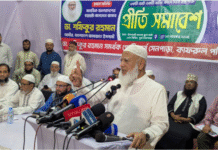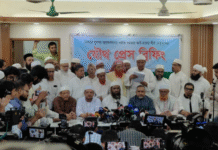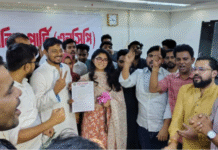Prime Minister Sheikh Hasina has asked the opposition BNP to sue The Washington Times as it is claiming that the US daily published an article forging Khaleda Zia’s signature.
“Why don’t you (BNP) sue The Washington Times if the signature is really fake?” she said while addressing a meeting of expatriate Bangladeshis living in Britain and other European countries at Hilton Hotel, London on Friday evening (local time).
Sheikh Hasina also came down heavily on the opposition leader for writing the article in The Washington Times requesting the US government for cancelling the Generalized System of Preferences (GSP) facility for Bangladeshi products to the US market.
Hasina alleged that BNP chairperson Khaleda Zia has actually tarnished Bangladesh’s image by requesting the US government to impose economic sanctions on Bangladesh.
Referring to disowning of the article by Khaleda Zia, she said the BNP chairperson and its leaders are now disowning it following the suspension of the GSP facility for Bangladeshi products to the US market to escape blame.
She mentioned that the front-ranking BNP leaders are now claiming the write-up was published using fake signature of Begum Khaleda Zia. “But, initially senior BNP leaders made various comments in favour of the article projecting its justification though they are denying it.”
The Prime Minister questioned how The Washington Times has shown such an audacity by publishing the article in the name of Khaleda Zia if she did not write it at all.
In this connection, Hasina said The Washington Times has recently made it clear it was Khaleza Zia who wrote that article. “This has proved how a big liar the BNP is?”
She urged the expatriate Bangladeshis to find out the London-based Public Relation firm, BTP, which pursued the Washington Times to publish Khaleda Zia’s article, and unearthed the fact.
Talking about militancy, terrorism and corruption patronised by BNP-Jamaat during its rule, Hasina warned that the country’s image would be tarnished again if they return to power.
She said the present government after assuming office revived the country’s image by containing terrorism and militancy with an iron hand, and implementing massive development programmes.
Besides, she said, the government has ensured the food and social security of people as well as minimised public sufferings to a great extent by generating more electricity. “No government other than Awami League could carry out such development in the past.”
The Prime Minister requested the expatriate Bangladeshis to project the tremendous successes of the government in various fields ahead of the next general election.
Referring to violent activities and vandalism in early May by Jamaat and Hefajat Islam, Sheikh Hasina said a deep-rooted conspiracy was hatched from May 4 to 6 to unseat the government, but the government foiled it.
She said BNP, Jamaat and Hefajat-e -Islam activists carried out arson attacks inside and outside the Baitul Mukarram National Mosque, torched banks, government offices, shops and vehicles and the copies of holy Quran.
The Prime Minister said the poor and hapless hawkers of Baitul Mukarram areas turned paupers as their small shops were burned by the miscreants of BNP Jamaat and Hefajat e Islam. “People are well aware of those who burned holy Quran, felled trees and torched the shops of the hawkers in the name of movement,” she said.
Sheikh Hasina said her government is providing financial assistance to the hawkers who became penniless due to the rampage of BNP, Jamaat and Hefajat-e-Islam.
Later, the Prime Minister received donations from the expatriate Bangladeshis for the victims of the Rana Plaza tragedy. In this connection, she said her government is providing financial assistance to the injured and the family members of the deceased of Savar Rana Plaza.
Foreign Minister Dr Dipu Moni, president of UK Awami League Sultan Mahmud Sharif, president of all European Awami League Anil Das Gupta, president of UK Awami League Advisory Committee Shamsuddin Khan and general secretary of UK Awami League Shamsuddin Khan were present.
Source: UNBConnect










